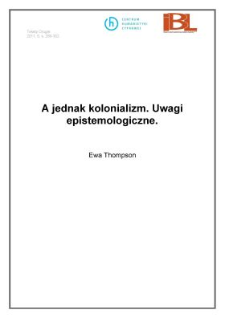- Search in all Repository
- Literature and maps
- Archeology
- Mills database
- Natural sciences
Advanced search
Advanced search
Advanced search
Advanced search
Advanced search

Object
Title: A jednak kolonializm. Uwagi epistemologiczne
Subtitle:
Publisher:
Place of publishing:
Description:
21 cm ; Tekst pol., streszcz. ang.
Type of object:
References:
1. R. Bideleux, I. Jeffries, A history of Eastern Europe. Crisis and change, Routledge, Londyn 2007, s. 461.
2. G. Borkowska, Perspektywa postkolonialna na gruncie polskim – pytania sceptyka, s. 40-52, „Teksty Drugie” 2010 nr 5.
3. D. Chioni-Moore, Is the post- in postcoloniał the post-in Post-Soviet? Toward a global postcoloniał critique, „PMLA” 2001 t. 116 nr 1, s. 111-128.
4. L. Connell, Modes of marginality. Scottish literature and the uses of postcolonial theory, „Comparative Studies of Souty Asia, Africa and the Middle East” 2003 t. 23 nr 1-2, s. 41-53.
5. J. Derrida, Of grammatology, przeł. G. Spivak, John Hopkins University Press, Baltimore (MD) 1978, s. 158.
6. A. Etkind, Internal colonization. Russia’s imperial experience, Polity Press, Londyn 2011.
7. N. Fraser, Rethinking recognition, „New Left Review” 2000 nr 3, s. 107-120.
8. M. Hechter, Internal colonialism. The Celtic fringe in British nationał development, 1536-1966, University of California Press, Berkeley 1975.
9. M. Kelly, Irish nationalist opinion and the British Empire in the 1850s and 1860s, „Past and Present” 2003 t. 204 nr 1, s. 127-154.
10. L. Koczanowicz, Post-postkomunizm a kulturowe wojny, s. 6-21, „Teksty Drugie” 2010 nr 5.
11. D. Kołodziejczyk, Postkolonialny transfer na Europę Środkowo-Wschodnią, s. 22-39, „Teksty Drugie” 2010 nr 5.
12. G. Lukács, Main currents of Marxism, t. 3. Oxford University Press, Oxford 1978, s. 265.
13. T. O’Keefe, Mitteleuropa blues, perilous remedies. Andrzej Stasiuk’s harsh world, „Sarmatian Review” 2012 t. 32 nr 1.
14. B. O’Leary, J. McGarry, Understanding northern Ireland. Colonialism, control and consociation, wyd. 3, Routledge, Londyn 2012.
15. E. Ostrowska, Desiring the Other. The ambivalent Polish self in novel and film („Slavic Review” 2011 t. 70 nr 3), s. 503-523.
16. R. Pearson, The rise and fall of the Soviet Empire, Macmillan, Nowy Jork 1978, s. 28-31.
17. E. Said, Orientalism, Vintage Books, Nowy Jork 1994, s. 315-321.
18. D. Skórczewski, „Sen srebrny Salomei”, czyli parada hybryd, „Pamiętnik Literacki” 2011 z. 1, s. 47-75.
19. D. Skórczewski, Dlaczego Paweł Huelle napisał „Castorpa”?, „Teksty Drugie” 2006 nr 3, s. 148-157.
20. E.M. Thompson, Dialog polsko-rosyjski, „Kultura” (Paryż) wrzesień 1991, s. 155-160.
21. E. Thompson, Whose discourse? Telling the story in post-communist Poland, „The Other Shore. Slavic and East European Cultures Abroad” 2010, s. 1-15.
Relation:
Issue:
Start page:
End page:
Detailed Resource Type:
Format:
Resource Identifier:
oai:rcin.org.pl:48486 ; 0867-0633
Source:
IBL PAN, call no. P.I.2524 ; click here to follow the link
Language:
Language of abstract:
Rights:
Terms of use:
Copyright-protected material. May be used within the limits of statutory user freedoms
Digitizing institution:
Institute of Literary Research of the Polish Academy of Sciences
Original in:
Library of the Institute of Literary Research PAS
Projects co-financed by:
Programme Innovative Economy, 2010-2014, Priority Axis 2. R&D infrastructure ; European Union. European Regional Development Fund
Access:
Object collections:
- Digital Repository of Scientific Institutes > Partners' collections > Institute of Literary Research PAS > Serials
- Digital Repository of Scientific Institutes > Literature > Journals/Articles
Last modified:
Oct 2, 2020
In our library since:
Oct 9, 2014
Number of object content downloads / hits:
3107
All available object's versions:
https://rcin.org.pl./publication/65746
Show description in RDF format:
Show description in RDFa format:
Show description in OAI-PMH format:
| Edition name | Date |
|---|---|
| Thompson E. - A jednak kolonializm. Uwagi epistemologiczne | Oct 2, 2020 |
Objects Similar
Borkowska, Grażyna
Borkowska, Grażyna
Connell, Raewyn
Pawłowski, Stanisław (1882–1940)
Stryjek, Tomasz (1964– )
Engelking, Anna

 INSTYTUT ARCHEOLOGII I ETNOLOGII POLSKIEJ AKADEMII NAUK
INSTYTUT ARCHEOLOGII I ETNOLOGII POLSKIEJ AKADEMII NAUK
 INSTYTUT BADAŃ LITERACKICH POLSKIEJ AKADEMII NAUK
INSTYTUT BADAŃ LITERACKICH POLSKIEJ AKADEMII NAUK
 INSTYTUT BADAWCZY LEŚNICTWA
INSTYTUT BADAWCZY LEŚNICTWA
 INSTYTUT BIOLOGII DOŚWIADCZALNEJ IM. MARCELEGO NENCKIEGO POLSKIEJ AKADEMII NAUK
INSTYTUT BIOLOGII DOŚWIADCZALNEJ IM. MARCELEGO NENCKIEGO POLSKIEJ AKADEMII NAUK
 INSTYTUT BIOLOGII SSAKÓW POLSKIEJ AKADEMII NAUK
INSTYTUT BIOLOGII SSAKÓW POLSKIEJ AKADEMII NAUK
 INSTYTUT CHEMII FIZYCZNEJ PAN
INSTYTUT CHEMII FIZYCZNEJ PAN
 INSTYTUT CHEMII ORGANICZNEJ PAN
INSTYTUT CHEMII ORGANICZNEJ PAN
 INSTYTUT FILOZOFII I SOCJOLOGII PAN
INSTYTUT FILOZOFII I SOCJOLOGII PAN
 INSTYTUT GEOGRAFII I PRZESTRZENNEGO ZAGOSPODAROWANIA PAN
INSTYTUT GEOGRAFII I PRZESTRZENNEGO ZAGOSPODAROWANIA PAN
 INSTYTUT HISTORII im. TADEUSZA MANTEUFFLA POLSKIEJ AKADEMII NAUK
INSTYTUT HISTORII im. TADEUSZA MANTEUFFLA POLSKIEJ AKADEMII NAUK
 INSTYTUT JĘZYKA POLSKIEGO POLSKIEJ AKADEMII NAUK
INSTYTUT JĘZYKA POLSKIEGO POLSKIEJ AKADEMII NAUK
 INSTYTUT MATEMATYCZNY PAN
INSTYTUT MATEMATYCZNY PAN
 INSTYTUT MEDYCYNY DOŚWIADCZALNEJ I KLINICZNEJ IM.MIROSŁAWA MOSSAKOWSKIEGO POLSKIEJ AKADEMII NAUK
INSTYTUT MEDYCYNY DOŚWIADCZALNEJ I KLINICZNEJ IM.MIROSŁAWA MOSSAKOWSKIEGO POLSKIEJ AKADEMII NAUK
 INSTYTUT PODSTAWOWYCH PROBLEMÓW TECHNIKI PAN
INSTYTUT PODSTAWOWYCH PROBLEMÓW TECHNIKI PAN
 INSTYTUT SLAWISTYKI PAN
INSTYTUT SLAWISTYKI PAN
 SIEĆ BADAWCZA ŁUKASIEWICZ - INSTYTUT TECHNOLOGII MATERIAŁÓW ELEKTRONICZNYCH
SIEĆ BADAWCZA ŁUKASIEWICZ - INSTYTUT TECHNOLOGII MATERIAŁÓW ELEKTRONICZNYCH
 MUZEUM I INSTYTUT ZOOLOGII POLSKIEJ AKADEMII NAUK
MUZEUM I INSTYTUT ZOOLOGII POLSKIEJ AKADEMII NAUK
 INSTYTUT BADAŃ SYSTEMOWYCH PAN
INSTYTUT BADAŃ SYSTEMOWYCH PAN
 INSTYTUT BOTANIKI IM. WŁADYSŁAWA SZAFERA POLSKIEJ AKADEMII NAUK
INSTYTUT BOTANIKI IM. WŁADYSŁAWA SZAFERA POLSKIEJ AKADEMII NAUK




































